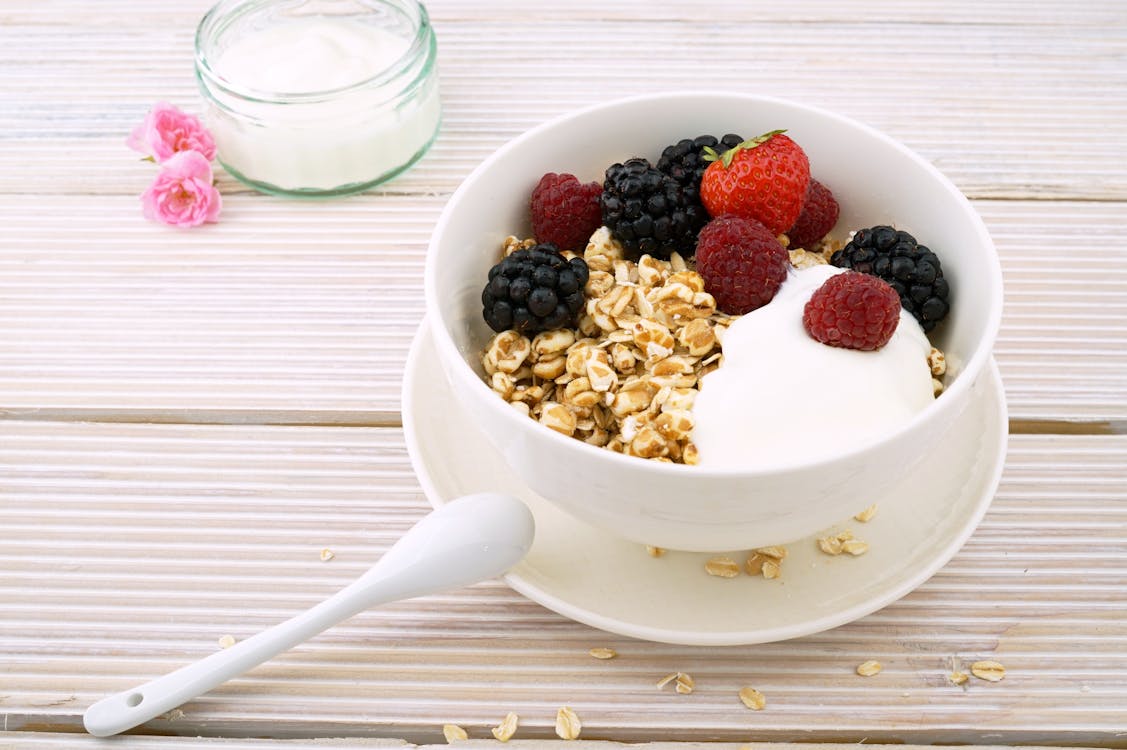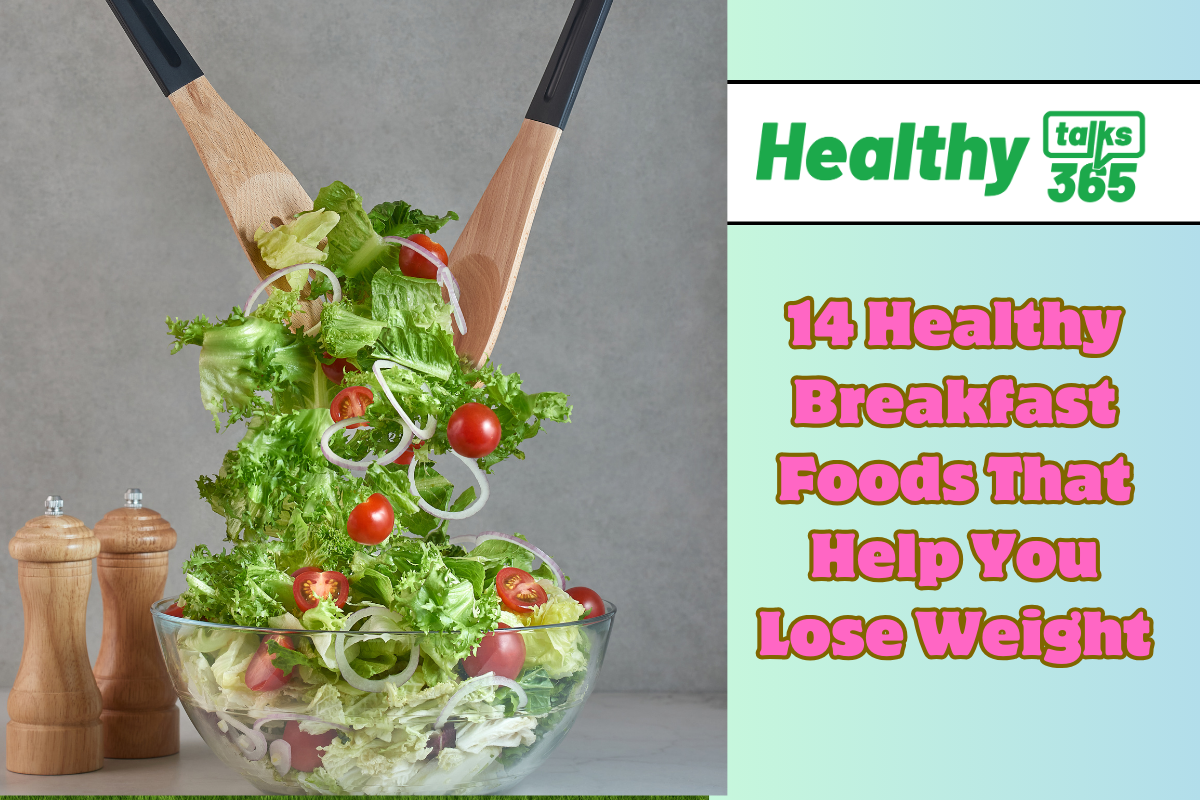14 Healthy Breakfast Foods That Help You Lose Weight
1. Having Oatmeal for breakfast helps in losing weight
Oatmeal is a nutritious whole grain that is high in fiber and protein, both of which contribute to feelings of fullness and satiety. This can help prevent overeating later in the day and reduce overall calorie intake, thereby supporting weight loss.
Additionally, oatmeal has a low glycemic index, meaning it does not cause rapid spikes in blood sugar levels. Stable blood sugar levels can help control cravings and hunger, making it easier to stick to a healthy eating plan.
Moreover, oatmeal is a versatile breakfast option that can be customized with various toppings such as fruits, nuts, seeds, and spices. These additions can enhance the flavor and nutritional value of oatmeal while still supporting weight loss goals.
Overall, incorporating oatmeal into your breakfast routine can be a beneficial choice for those looking to manage their weight, as part of a balanced diet and healthy lifestyle.
Read Also:
Focus While Studying: 10 Proven Methods
2. Greek yoghurt helps in weight loss
Greek yogurt can be a valuable addition to a weight loss regimen.
It is high in protein, which is known to increase feelings of fullness and reduce appetite, potentially leading to lower calorie intake throughout the day. Protein also helps preserve lean muscle mass during weight loss, which is important for maintaining metabolic rate.
Greek yogurt is lower in carbohydrates and sugar compared to regular yogurt, making it a suitable option for those watching their carbohydrate intake or trying to manage blood sugar levels.
It contains probiotics, beneficial bacteria that support gut health. A healthy gut microbiome has been associated with improved weight management and metabolism.
Greek yogurt is also versatile and can be included in a variety of meals and snacks, such as smoothies, parfaits, dips, and dressings, making it easy to incorporate into a weight loss diet.

3. Breakfast with eggs helps in reducing weight
Eggs are a nutrient-dense food that provides high-quality protein, essential vitamins, and minerals. Protein is particularly beneficial for weight loss because it increases feelings of fullness and satiety, which can help reduce overall calorie intake throughout the day.
Moreover, studies have shown that starting the day with a high-protein breakfast, such as eggs, can help control cravings and prevent overeating later in the day. This can lead to better adherence to a calorie-controlled diet and support weight loss goals.
Eggs are also low in calories and carbohydrates while being rich in nutrients, making them a satisfying and nutritious breakfast option. Additionally, eggs contain healthy fats that support overall health and can help keep you feeling full and satisfied until your next meal.
They are versatile and can be prepared in various ways, such as boiled, scrambled, poached, or made into omelets or frittatas. This versatility allows for a wide range of delicious and satisfying breakfast options that can fit into a weight loss plan.
4. Berries aid in weight loss
Berries, such as strawberries, blueberries, raspberries, and blackberries, are low in calories but high in fiber. Fiber contributes to feelings of fullness and satiety, which can help control appetite and reduce overall calorie intake. Additionally, fiber supports digestive health and regular bowel movements, promoting overall well-being.
They are rich in antioxidants, which help combat oxidative stress and inflammation in the body. Chronic inflammation has been linked to weight gain and obesity, so consuming antioxidant-rich foods like berries may help mitigate these effects.
Berries also have a low glycemic index, meaning they have a minimal impact on blood sugar levels. Stable blood sugar levels can help regulate appetite and reduce cravings for sugary and high-calorie foods, which can support weight loss efforts.
Moreover, berries are versatile and can be easily incorporated into a variety of meals and snacks. They can be enjoyed fresh, frozen, or dried, and added to smoothies, yogurt, oatmeal, salads, or enjoyed on their own as a nutritious snack.
Read Also:
11 Best Ways to Improve Your Digestion
5. Nuts are the best weight loss friendly breakfast
Nuts are packed with healthy fats, protein, fiber, vitamins, and minerals, making them a nutrient-dense food choice. The combination of protein and fiber in nuts can help increase feelings of fullness and satiety, which may prevent overeating later in the day and support weight loss goals.
Furthermore, the healthy fats found in nuts, such as monounsaturated and polyunsaturated fats, are beneficial for heart health and may help reduce the risk of cardiovascular disease when consumed as part of a balanced diet.
Pairing nuts with other nutritious foods like fruits, yogurt, whole grains, or vegetables can create a well-balanced breakfast that provides a variety of nutrients and supports weight loss efforts.
Ultimately, while nuts can be a nutritious and satisfying breakfast option, it’s essential to consider them as part of a balanced diet and healthy lifestyle that includes regular physical activity and adequate hydration.
6. Having chia seeds for breakfast helps in weight loss
Chia seeds are high in fiber, particularly soluble fiber, which absorbs water and forms a gel-like substance in the stomach. This gel slows down digestion and helps increase feelings of fullness and satiety, which may reduce overall calorie intake throughout the day and support weight loss efforts.
Furthermore, chia seeds are low in calories but dense in nutrients, making them a nutrient-rich addition to your breakfast. They are a good source of protein, healthy fats, vitamins, minerals, and antioxidants, which contribute to overall health and well-being.
Moreover, the protein and healthy fats found in chia seeds help stabilize blood sugar levels and prevent spikes and crashes in energy levels, which can help regulate appetite and reduce cravings for unhealthy foods.
Chia seeds are also versatile and can be easily incorporated into a variety of breakfast options. They can be added to oatmeal, yogurt, smoothies, or used as a topping for salads, cereal, or baked goods.
7. Including cottage cheese in breakfast is a great choice for weight loss
Firstly, cottage cheese is high in protein, which is known to increase feelings of fullness and satiety. Protein also helps preserve lean muscle mass during weight loss, which is important for maintaining metabolic rate.
Moreover, cottage cheese is relatively low in calories but rich in nutrients, making it a satisfying and nutritious breakfast option. It contains essential nutrients such as calcium, phosphorus, and B vitamins, which support overall health and well-being.
Cottage cheese is versatile and can be easily incorporated into a variety of breakfast dishes. It can be enjoyed on its own with fruit or nuts, added to smoothies or oatmeal, or used as a topping for toast or pancakes.
It is low in carbohydrates and sugar, making it a suitable option for those watching their carbohydrate intake or trying to manage blood sugar levels.
It contains probiotics, beneficial bacteria that support gut health. A healthy gut microbiome has been associated with improved weight management and metabolism.

8. Avocados in breakfast aid in weight loss
Avocados are rich in healthy fats, particularly monounsaturated fats, which have been shown to promote satiety and reduce appetite. Consuming foods high in healthy fats can help keep you feeling full and satisfied for longer periods, potentially leading to reduced calorie intake throughout the day.
Avocados are low in carbohydrates and contain a good amount of dietary fiber. Fiber helps regulate digestion and promotes feelings of fullness, which can aid in weight loss by preventing overeating and reducing cravings for unhealthy foods.
Avocados are nutrient-dense and provide a variety of vitamins, minerals, and antioxidants. They are particularly rich in potassium, vitamin K, folate, and vitamin C, which support overall health and well-being.
Avocados are also versatile and can be easily incorporated into a wide range of breakfast dishes. They can be sliced and added to toast, blended into smoothies, mashed and spread on oatmeal or pancakes, or used as a topping for eggs or salads.
9. Whole grains eaten in breakfast helps in losing weight
Whole grains are rich in dietary fiber, which helps promote feelings of fullness and satiety. This can help reduce overall calorie intake by preventing overeating and reducing cravings for unhealthy foods throughout the day.
The fiber found in whole grains helps regulate digestion and promote regular bowel movements, which supports overall gut health and may aid in weight management.
Whole grains have a lower glycemic index compared to refined grains, meaning they cause a slower and more gradual increase in blood sugar levels. This can help stabilize energy levels and prevent spikes and crashes in blood sugar, which may reduce cravings for sugary and high-calorie foods.
Whole grains are nutrient-dense and provide essential vitamins, minerals, and antioxidants. They are particularly rich in B vitamins, iron, magnesium, and selenium, which support overall health and well-being.
10. Having Smoothie for breakfast is a good choice for weight loss
Firstly, smoothies can be a convenient and quick breakfast option, especially for those with busy schedules. They can be prepared in advance and consumed on the go, making them a convenient choice for busy mornings.
Secondly, smoothies can be customized to include a variety of nutrient-dense ingredients that support weight loss. For example, you can include fruits and vegetables like spinach, kale, berries, and bananas, which are low in calories but high in fiber, vitamins, and antioxidants. Fiber helps promote feelings of fullness and satiety, which can help reduce overall calorie intake and prevent overeating throughout the day.
Additionally, you can add protein-rich ingredients to your smoothie, such as Greek yogurt, protein powder, or nut butter, which further enhances feelings of fullness and helps preserve lean muscle mass during weight loss.
They are highly versatile and can be customized to suit individual taste preferences and dietary needs. You can experiment with different flavor combinations and ingredients to create a delicious and satisfying breakfast option that supports your weight loss goals.
Read Also:
Best Exercises And Yoga Poses For A Healthy Lifestyle
11. Green tea is a must have drink in a weight loss diet
Green tea contains compounds called catechins, particularly one called epigallocatechin gallate (EGCG), which have been studied for their effects on metabolism and weight loss. Research suggests that these compounds may help increase metabolism and promote fat oxidation, leading to greater calorie burning.
It is low in calories and can be a good alternative to high-calorie beverages like sugary sodas or juices. Drinking green tea instead of sugary drinks can help reduce overall calorie intake and support weight loss efforts.
Moreover, green tea contains caffeine, which is a stimulant that can temporarily boost metabolism and increase energy expenditure. This can help enhance the calorie-burning effects of green tea and may support weight loss when combined with a calorie-controlled diet and regular exercise.
Furthermore, green tea is rich in antioxidants, which help protect cells from damage and support overall health. Antioxidants may also play a role in reducing inflammation and improving insulin sensitivity, which are important factors in weight management.

12. Protein shake for breakfast increases metabolism and aids in weight loss
Protein is known to have a high thermic effect, meaning that the body requires more energy to digest and metabolize protein compared to carbohydrates or fats. This can lead to a temporary increase in metabolism, as the body works harder to break down and utilize the protein consumed.
Consuming a protein-rich breakfast, such as a protein shake, can help increase feelings of fullness and satiety, which may prevent overeating later in the day. This can result in reduced calorie intake overall, supporting weight loss goals.
Moreover, protein shakes are convenient and easy to prepare, making them a quick and efficient breakfast option for busy mornings. They can be customized with various ingredients such as protein powder, milk or milk alternatives, fruits, vegetables, and healthy fats like nut butter or seeds, allowing for a balanced and nutritious meal.
Protein shakes can help preserve lean muscle mass during weight loss, which is important for maintaining metabolic rate and overall body composition. Adequate protein intake supports muscle repair and growth, especially when combined with regular exercise.
13. Having Flaxseeds with breakfast is the best option to lose weight
Flaxseeds are rich in dietary fiber, particularly soluble fiber, which can help promote feelings of fullness and satiety. This can lead to reduced appetite and overall calorie intake, supporting weight loss efforts.
Moreover, the soluble fiber in flaxseeds forms a gel-like substance when mixed with water, which slows down digestion and helps stabilize blood sugar levels. This can help prevent spikes and crashes in blood sugar, which may reduce cravings for sugary and high-calorie foods.
Flaxseeds are a good source of healthy fats, particularly omega-3 fatty acids, which have been associated with various health benefits, including weight loss. Omega-3 fatty acids may help reduce inflammation, improve insulin sensitivity, and increase fat burning, all of which can support weight loss.
Flaxseeds contain lignans, which are plant compounds with antioxidant properties. These lignans may help reduce inflammation and support overall health, which is important for maintaining a healthy weight.
14. Including Vegetable omelette in breakfast helps in weight loss
Omelettes made with vegetables are low in calories but high in nutrients, making them a satisfying and nutritious breakfast option. Vegetables are rich in dietary fiber, vitamins, and minerals, which can help promote feelings of fullness and satiety while providing essential nutrients for overall health.
Adding vegetables to an omelette increases its volume and fiber content without significantly increasing its calorie density. This can help increase the volume of food consumed without adding excess calories, which may lead to reduced calorie intake overall and support weight loss efforts.
Omelettes are a versatile breakfast option that can be customized with a variety of vegetables to suit individual taste preferences and dietary needs. Popular vegetable options for omelettes include spinach, tomatoes, bell peppers, onions, mushrooms, and broccoli, among others.





